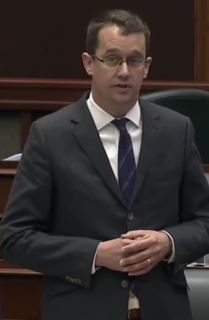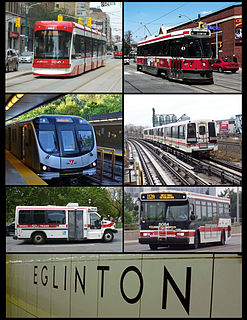
James Michael Flaherty, was Canada's federal Minister of Finance (2006–2014) and also a former provincial Minister of Finance for Ontario (2001–2002). From 1995 until 2005, he was the Member of Provincial Parliament for Whitby—Ajax, and a member of the Ontario Progressive Conservative Party caucus and unsuccessfully sought the leadership of the provincial party on two occasions.

The Government of Ontario, formally Her Majesty's Government of Ontario, is the provincial government of the province of Ontario, Canada. Its powers and structure are set out in the Constitution Act, 1867.
The municipal government of Toronto, corporately known as the City of Toronto, is a public corporation providing services to Toronto, Ontario, Canada. It is administered by 25 elected councillors who, along with the Mayor of Toronto, make up the Toronto City Council. Torontonians elect a new council every four years, in October.

Transit City was a plan for developing public transport in Toronto, Ontario, Canada. It was first proposed and announced on 16 March 2007 by then-Toronto Mayor David Miller and Chair of the Toronto Transit Commission (TTC) Adam Giambrone. The plan called for the construction of seven new light rail lines along the streets of seven priority transit corridors, which would have eventually been integrated with existing rapid transit, streetcar, and bus routes. Other transit improvements outlined in the plan included upgrading and extending the Scarborough RT line, implementing new bus rapid transit lines, and improving frequency and timing of 21 key bus routes. The plan integrated public transportation objectives outlined in the City of Toronto Official Plan, the TTC Ridership Growth Strategy and Miller's 2006 election platform.
The Canadian federal budget for the 2007–2008 fiscal year was presented to the House of Commons of Canada by Finance Minister Jim Flaherty on March 19, 2007. The federal budget included $14 billion in new spending and $5.7 billion in tax cuts. This was the second budget of the 39th Canadian Parliament.
Charles Sousa is a politician in Ontario, Canada. Sousa was the Liberal member of the Legislative Assembly of Ontario for Mississauga South from 2007 until 2018. He was a Cabinet minister in the governments of Dalton McGuinty and Kathleen Wynne, the latter where he served as Minister of Finance.
Josh Matlow is a community advocate and Toronto City Councillor for Toronto-St. Paul's. He served as a school trustee representing the midtown Toronto riding of St. Paul's between 2003 and 2010 at the Toronto District School Board. On October 25, 2010, Matlow was elected to Toronto City Hall. He was re-elected in 2014 with the largest number of votes and highest plurality of any candidate running for Toronto City Council across the city.
Since its election to power on January 23, 2006, the Conservative Party of Canada led by Prime Minister Stephen Harper adopted several positions and policies in regard to the economic issues of Canada, including various tax cuts, exemptions and credits as well as discussing the issue of fiscal imbalance among provinces and measures to cope with more troubled sectors of the Canadian economy.
In Canada, motor vehicles are primarily powered by gasoline or diesel fuel. Other energy sources include ethanol, biodiesel, propane, compressed natural gas (CNG), electric batteries charged from an external source, and hydrogen. Canada, like most countries, has excise taxes and other taxes on gasoline, diesel, and other liquid and gas motor fuels, and also taxes electricity at various administrative levels. Most provinces and territories in Canada also have taxes on these motor fuels, and some metropolitan areas such as Montreal, Greater Vancouver, and Victoria impose additional taxes.
The Canadian federal budget for the 2009-2010 fiscal year was presented to the House of Commons of Canada by Finance Minister Jim Flaherty on January 27, 2009. The federal budget included $40 billion in stimulus and $20 billion in personal income tax cuts.
In Canada, municipal government is a type of local council authority that provides local services, facilities, safety and infrastructure for communities. Canada has three levels of government; federal, provincial and municipal. According to Section 92(8) of the Constitution Act, 1867, "In each Province the Legislature may exclusively make Laws in relation to... Municipal Institutions in the Province." There are about 3,700 municipal governments in Canada. Municipal governments are established under provincial/territorial authority.

The Canadian government debt, commonly called the "public debt" or the "national debt", is the amount of money owed by the Government of Canada to holders of Canadian Treasury security. In 2014, Canada's national debt stood at roughly CAD$700 billion. With the total GDP somewhere around CAD$1.8 trillion, Canada's overall debt/GDP ratio is around 39%. "Gross debt" is the national debt plus intragovernmental debt obligations or debt held by trust funds. Types of securities sold by the government include treasury bills, notes, bonds, Real Return Bonds, Canada Savings Bonds, and provincial government securities.

Transparency International's 2016 Corruption Perception Index ranks Canada as the 9th least corrupt nation out of 176 countries, and the least corrupt nation in the Americas. However, in recent years corruption has been an increasingly large problem in government, industry and non-governmental organizations. For instance, in 2013, the World Bank blacklisted SNC-Lavalin and its subsidiaries from "bidding on its global projects under its fraud and corruption policy" due to the Padma Bridge scandal. Canada also ranks at the bottom of the bribery-fighting rankings, "with little or no enforcement of anti-bribery measures". The 2014 Ernst & Young global fraud survey found that "twenty percent of Canadian executives believe bribery and corruption are widespread in this country". According to a study by the Graduate School of Public Policy at the University of Saskatchewan, "a large proportion of Canadians see their politicians and their institutions as fundamentally corrupt".

The Greek government-debt crisis was the sovereign debt crisis faced by Greece in the aftermath of the financial crisis of 2007–08. Widely known in the country as The Crisis, it reached the populace as a series of sudden reforms and austerity measures that led to impoverishment and loss of income and property, as well as a small-scale humanitarian crisis. In all, the Greek economy suffered the longest recession of any advanced capitalist economy to date, overtaking the US Great Depression. As a result, the Greek political system has been upended, social exclusion increased, and hundreds of thousands of well-educated Greeks have left the country.

Monte Gary McNaughton is a politician in Ontario, Canada who is currently serving as Minister of Labour of Ontario. He is a Progressive Conservative member of the Legislative Assembly of Ontario who represents the riding Lambton—Kent—Middlesex. He has been a member since the 2011 Election.

The 2014 Ontario general election was held on June 12, 2014, to elect the members of the 41st Parliament of Ontario. The Liberal Party won a majority of seats in the legislature, allowing its leader, Kathleen Wynne, to continue as premier, moving from a minority to majority government. This was the Liberals' fourth consecutive win since 2003 and an improvement from their performance in the 2011 election. The Progressive Conservatives under Tim Hudak were returned to the official opposition; following the election loss, Hudak announced his resignation as Progressive Conservative leader. The New Democratic Party under Andrea Horwath remained in third place, albeit with an improved share of the popular vote.
The Canadian federal budget for fiscal year 2013–2014 was presented to the House of Commons of Canada by Finance Minister Jim Flaherty on 21 March 2013. The budget bill was tabled in the legislature on 29 April 2013 as the Economic Action Plan 2013 Act, No. 1. A second budget bill will be tabled in the autumn, which will include elements excluded from the first bill, such as the Canada Job Grant. The deficit was projected to be $18.7 billion for the fiscal year 2013-2014, however this was adjusted to $8.1 billion by end of the fiscal year and once the Auditor General's recommendations on the Government's unfunded pension obligations were taken into account.

The Canadian federal budget for fiscal year 2015–2016 was presented to the House of Commons of Canada by Joe Oliver on 21 April 2015. This was the last budget before the 2015 federal election. The budget was supposed to be presented in February or March before the fiscal year began on April 1, but was delayed because of the steep drop in oil prices in the winter of 2014–15. A surplus of $1.4 billion was projected for the fiscal year 2015-2016, however this was adjusted by the new government to a deficit of $1.0 billion by end of March 2016. This was later adjusted to $2.9 billion after reflecting a change requested by the Auditor General dating back 10 years' worth of federal budgets, specifically with regards to the discount rate methodology used to determine the present value of the Government's unfunded pension obligations.
The New York City Mayor's Office of Management and Budget, formerly New York City Office of Management and Budget, is the New York City government's chief financial agency, organized as part of the New York City Mayor's office. OMB staff, under the direction of the Mayor and the Budget Director, assemble and oversee the expense, revenue, and capital budgets for the city. The City of New York funds the activities of approximately 70 agencies with more than 300,000 full-time and full-time equivalent employees, for a Fiscal Year 2018 total of $86 billion.











